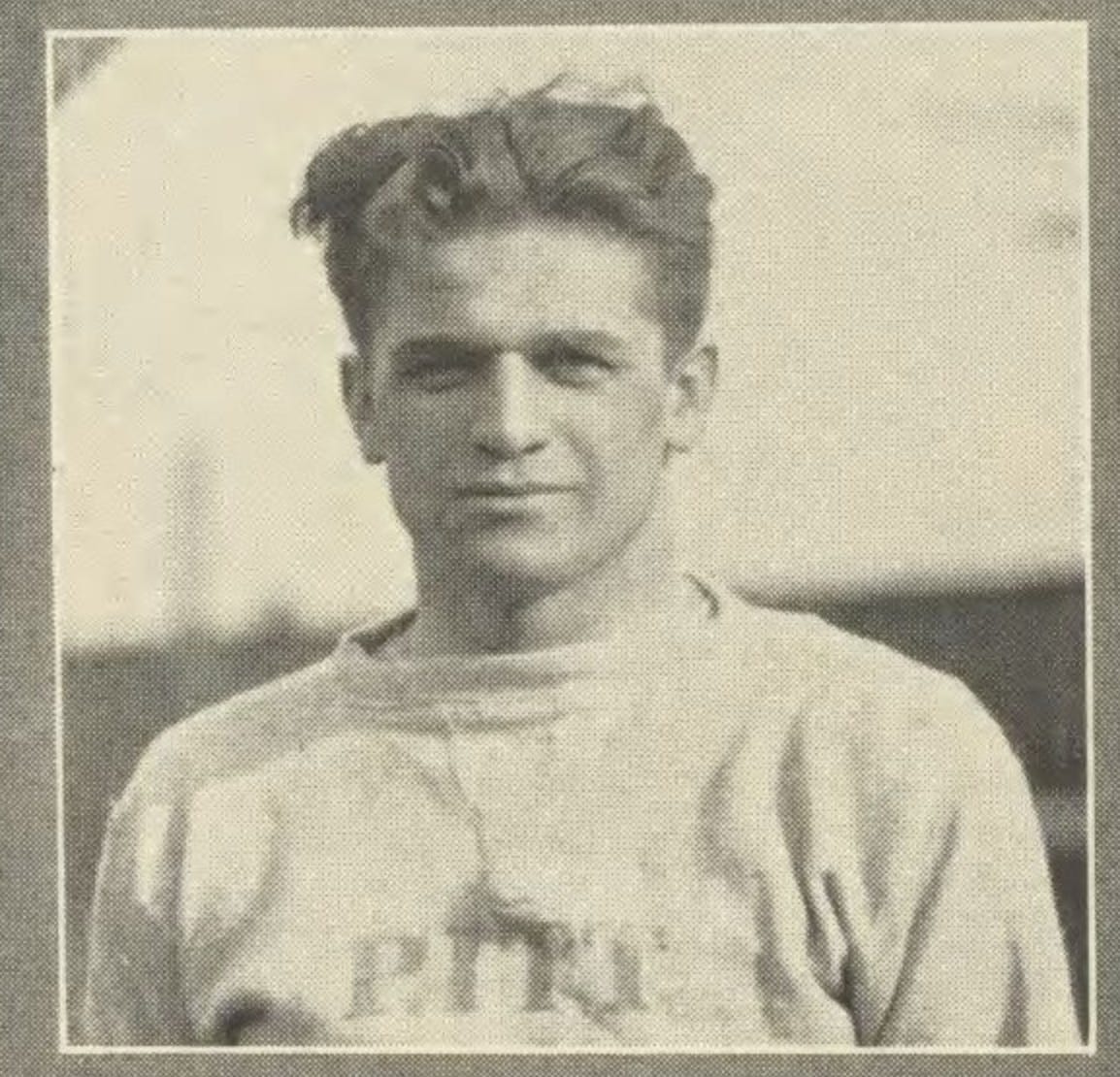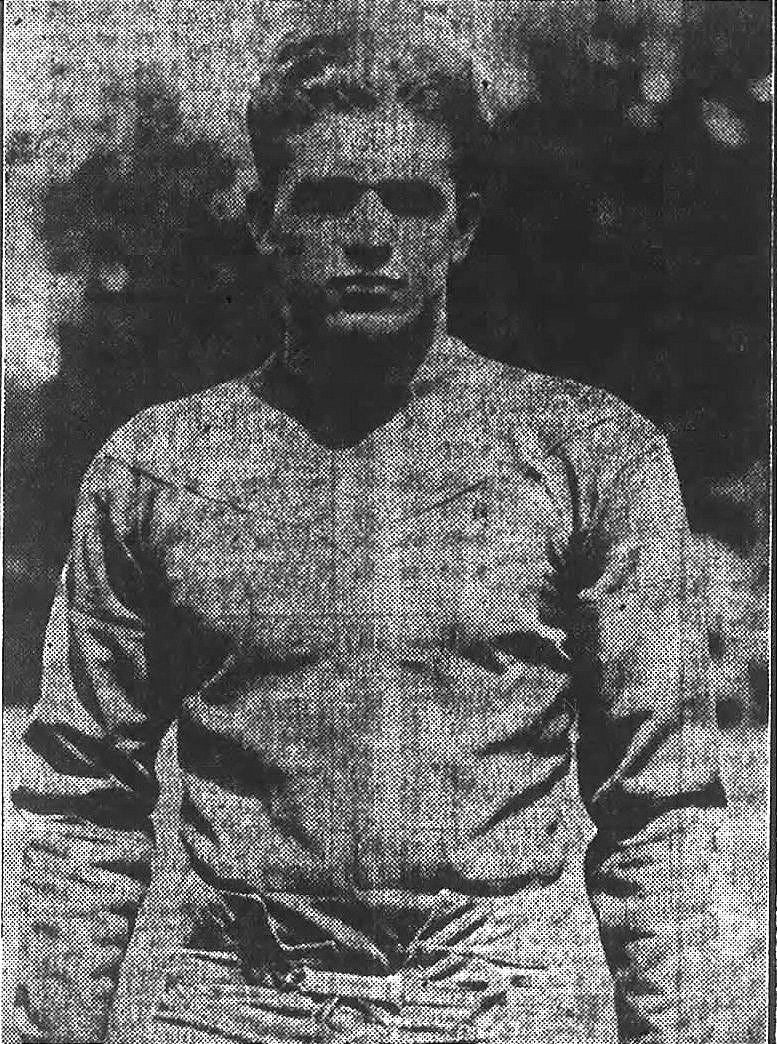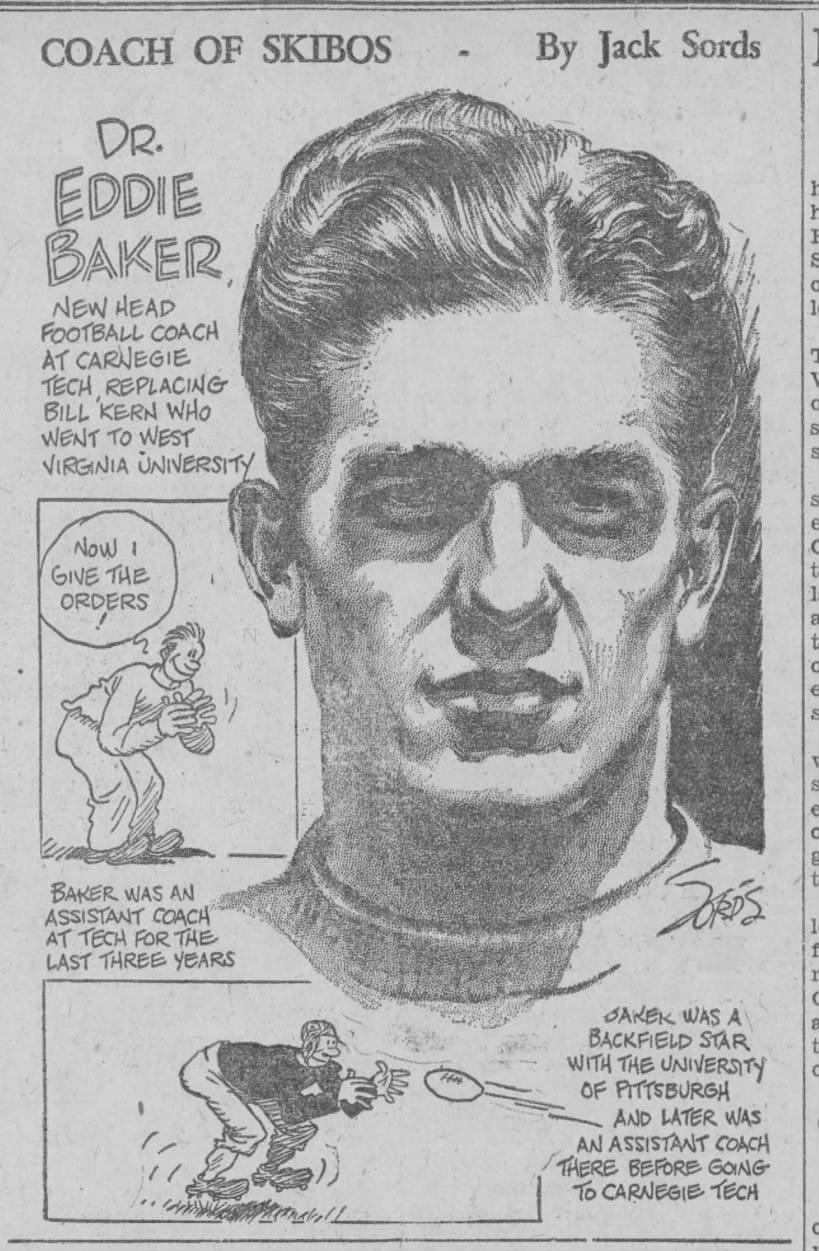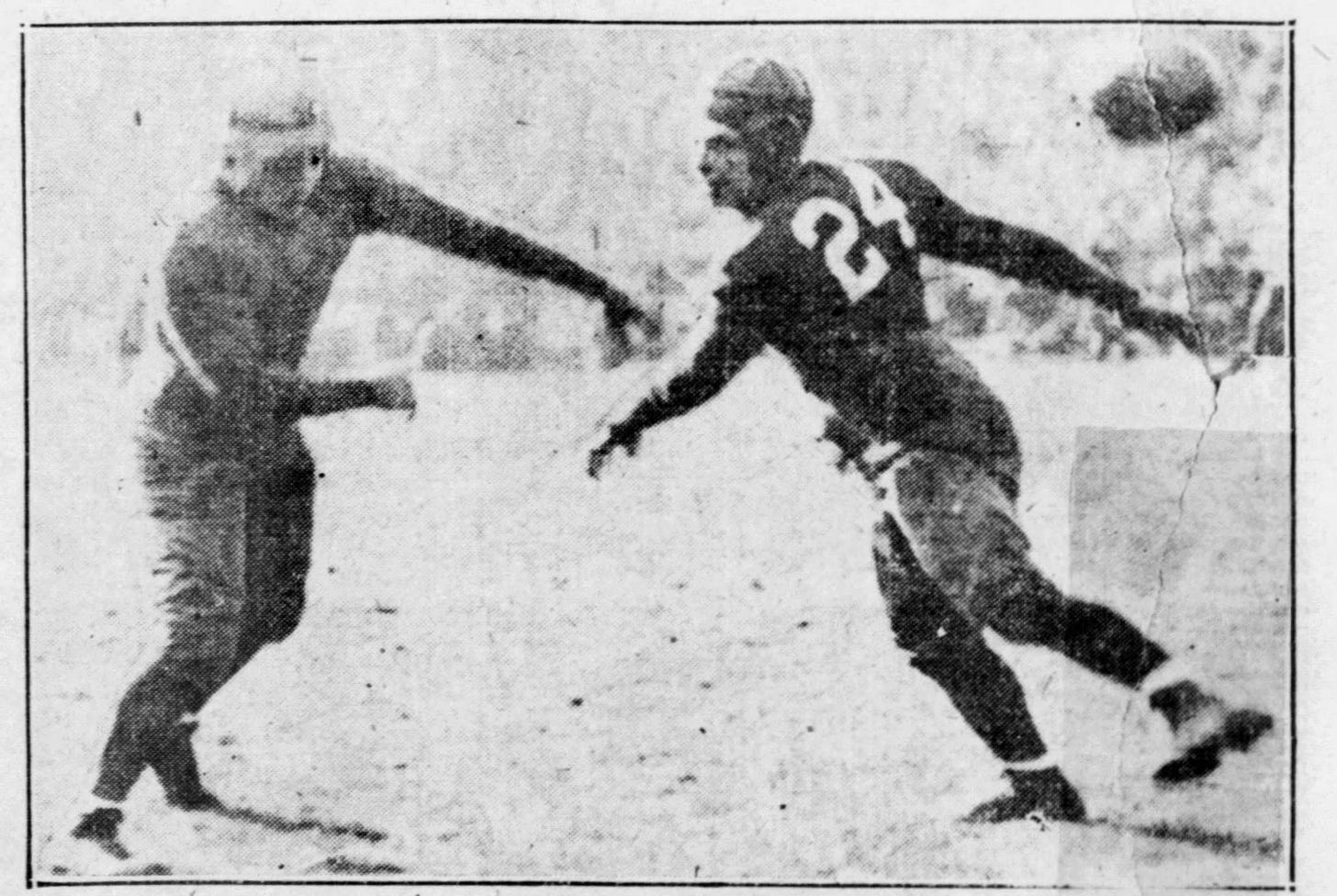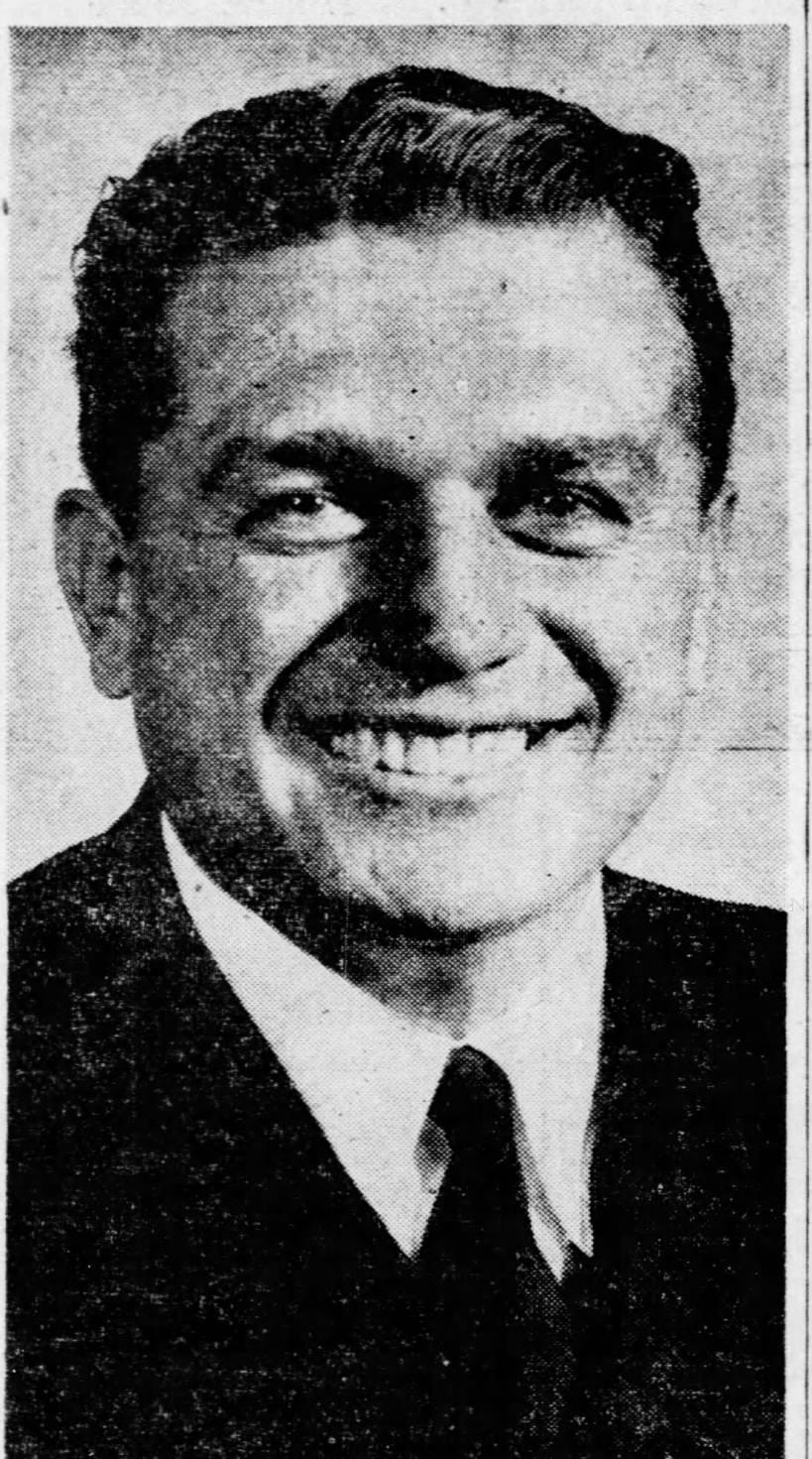Eddie Baker: The Wyoming Valley's great, forgotten sportsman
Former Pitt football and basketball captain, pro baseball player hailed from Nanticoke.
Sports writers who covered Eddie Baker called him “the best quarterback ever developed in Wyoming Valley” and “the greatest high school guard ever” to play basketball locally.
Nearly a century since Baker graduated high school, others have surely eclipsed him in speed, strength, skill and statistics. Versatility and toughness, however? More accomplished? Better prepared? Despite his legacy fading with time, Baker remains a cut above.
Born Aug. 22, 1909, in Nanticoke, Luzerne County, Baker graduated from Nanticoke High School in 1927. He was honored as the leading graduate among boys in the largest class (101 members) in school history at the time. He played three seasons of baseball and basketball and one season of football, coached by Frank Chicknoski.
Baker matriculated to the University of Pittsburgh. He not only played two sports but was elected a team captain in both of them. His coaches were Hall of Famers Jock Sutherland (football) and Doc Carlson (basketball).
Baker’s breakout football season came in 1929. He split quarterback duties with Bill Edwards, a Wyoming Seminary graduate, but earned the starting role in time for the Rose Bowl. Despite losing, 47-14, against USC, Baker was touted as one of Pitt’s lone bright spots in the game. Having a 9-1 record, Pitt was crowned national champion by selector Parke H. Davis.
Shortly after the season ended, Baker was announced as Sutherland’s hand-picked captain for the upcoming 1930 season.
Ralph Davis, of the Pittsburgh Press, reported on Baker’s captaincy in the authoritative, detailed, over-the-top writing prose that marked the era.
“Many a football captain is a leader in name only. Many of them lack practically all of the qualities Baker possesses,” Davis wrote. “They are put in place because they are popular personally, or because they possess great mechanical ability. But it takes something more than popularity or mere mechanical ability to make an outstanding leader.”
Davis continued: “He is a young man of convictions. He is not afraid to assert himself. If he thinks things are not going right, he will not be backward about asserting himself. He will want to know why. Having ascertained why, he will want to do what he can to correct any faults. Baker is a straight ‘A’ student in the school of dentistry. Any boy who can carry a heavy scholastic burden with ‘A’ marks, and, at the same time, find time to devote to sport, is worthy of such honors.”
As captain and full-time starting quarterback, Baker keyed the Panthers to a 4-0 start. In a 52-0 rout at Western Reserve, Baker recorded a 100-yard kickoff returned for a touchdown, reportedly the longest play of the 1930 college football season.
Pitt’s national title dreams were dashed in the fifth game, a 35-19 loss at home against Notre Dame, the eventual national champion. The Panthers finished with a 6-2-1 record. Pitt experts said 1930 was one of the most difficult schedules in program history.
After the season, Baker was the East’s starting quarterback in the East-West Shrine Game. The West won, 3-0.
Postseason honors poured in, too, with the Associated Press naming him an honorable mention All-American and the Newspaper Enterprise Association (NEA) putting him on its third team. The NEA also selected Baker to its first team All-East, calling him the region’s smartest quarterback.
“Jock Sutherland calls him the best all-around back he has coached at Pitt in 13 years,” the NEA said. “He passes, receives, punts, placekicks and runs and he is the whole show on defense. He is consistent.”
Record books show Baker was Pitt’s leading receiver in 1930 with 234 yards; not what you’d expect from a quarterback, but that’s how the game was played … and how Baker played.
As his football playing career ended, Baker began his senior basketball season as a Pitt captain. The Tartan, Carnegie Tech’s student newspaper, named Baker a second-team guard on its all-opponent team of players from St. John’s, Temple, West Virginia, Army and other Carnegie Tech foes. Baker was the lone pick from Pitt.
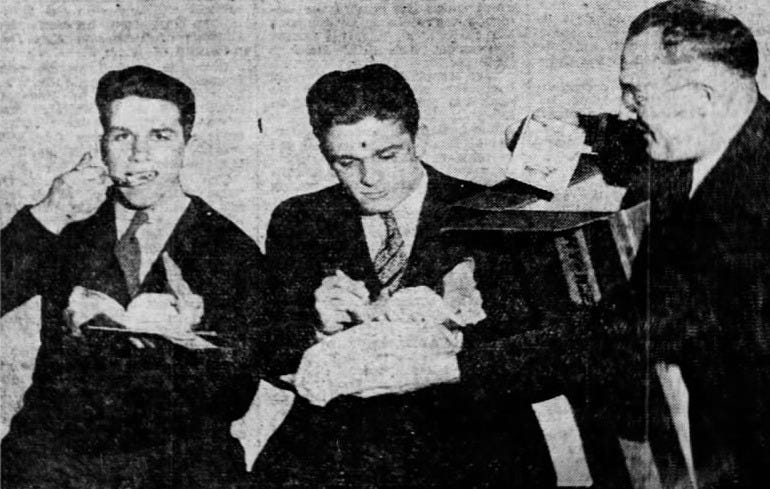
Baker’s departure from Pitt was a massive loss, especially for the football team. Pitt was frequently tapped as a national title contender before the 1931 season — with one caveat.
“Jock Sutherland’s big problem has been to find a quarterback to succeed brilliant Eddie Baker,” one report stated.
In 1931, Pitt went 8-1, losing only to Notre Dame.
Post-Pitt, Baker continued his basketball career with Nanticoke of the Penn State League. Tunkhannock, Dunmore, Pittston, Wilkes-Barre and Freeland also had league franchises.
In March 1933, 1,500 fans were drawn to Kirmer Park for “Eddie Baker Night.” The event featured gifts and presentations honoring Baker, who scored eight points in a very low-scoring win, 13-10, over Tunkhannock.
By the spring of 1933, Baker had begun his professional baseball career with the New York-Penn League’s Harrisburg Senators.
“Gee, I’m glad to be able to play in the NYP League this season with Harrisburg,” he told the Times Leader in June. “I can play against the Barons in Wilkes-Barre where many of my hometown fans will be able to see me in action. I want to make good this season. I have hopes of going higher in baseball and am aiming at the major leagues.”
According to Baseball-Reference, Baker, an outfielder and shortstop, played 30 games with Harrisburg and hit .231. Also in that rookie season, Baker played 75 games for the New England League’s New Bedford Whalers and hit a team-best .413. Baker played again for both teams and the New England League’s Hartford Senators in 1934.
Baker, 25, retired from baseball after the 1934 season.
Baker returned to football as an assistant coach at Pitt. He worked under Sutherland with Bill Kern, another past Pitt star from the Wyoming Valley. When Kern got the head coaching job at Carnegie Tech, Baker followed him. Baker was on staff at Carnegie Tech during the infamous “wrong down decision,” previously reported on College Football Incubator.
When Kern left Carnegie Tech in 1939 for the top post at West Virginia, Baker was named head coach. Baker compiled a 65-38-4 record over two stints (1940-42, 1949-59) and is the third-winningest coach ever at Carnegie Tech (now Carnegie Mellon University). During World War II, Baker served in the Navy and reunited with Kern on the Del Monte Pre-Flight service team coaching staff.
Throughout his tenure at Carnegie Tech, Baker coached and practiced dentistry. He was a dentist by day and scheduled football practice to begin at 5 p.m.
Baker was linked in 1956 to the NFL’s Pittsburgh Steelers’ head coaching vacancy. Baker characterized the talks as “exploratory” and rumors swirled for weeks because of his friendship with Steelers owner Art Rooney.
“There’s no question about it, he’s a great coach,” Rooney said. “And if we made any changes and he’s interested in the job, he’ll be right at the top of the list.”
Baker remained at Carnegie Tech, leading it to a 7-1 record in 1959. He was named Small College Football Coach of the Year by the Curbstone Coaches of Pittsburgh. Other award winners celebrated by the organization in 1959 included Pitt’s Foge Fazio and Penn State’s Richie Lucas as Most Valuable Players.
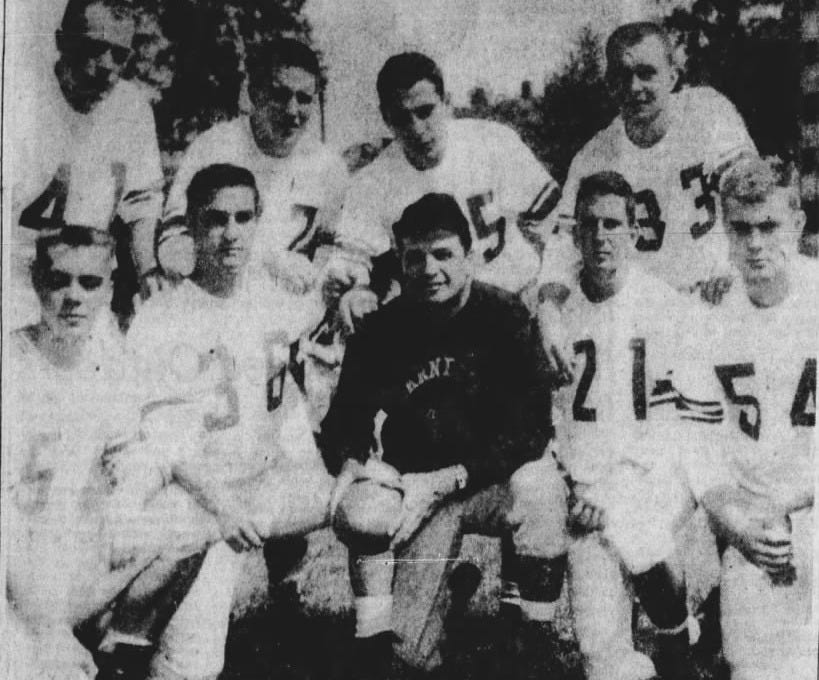
Tragedy struck that offseason when Baker was hospitalized and underwent major surgery. He reportedly suffered a blood clot and died at just 50 years old.
All the newspapers in Luzerne County covered Baker’s death, citing him as “one of the greatest, if not the greatest, quarterback ever to come out of Wyoming Valley.” It was Page 3 news, sharing a column with a local tax dispute.
In Pittsburgh, though, where he coached football and practiced dentistry, Baker’s death was high-profile, front-page news.
John Warner, President of Carnegie Tech, was among those who spoke to the Pittsburgh Press.
“His success is proved by his record, but you have to talk to some of the boys who played for him to really measure his worth,” Warner said. “I saw this in my own son, who played football for Eddie.”
The article gathered reactions from numerous others, including Rooney.
“Eddie lived at our home when he went to Pitt and was very close to our family,” Rooney said. “This is terrible news. He was truly a fine gentleman and a great coach.”
Baker’s loss was clearly felt more deeply in Pittsburgh, where he attended college, coached, worked and died. This partly explains his relative obscurity in the modern day in the Wyoming Valley. It’s worth noting, too, that he was born Edward Butkiewicz, unofficially changed his last name before college and finally petitioned the court in 1932 to officially change his name to Baker; the inconsistency could lead to confusion about his background.
Not entirely forgotten, however, the Nanticoke Lions Club in 1974 established the Dr. Edward Baker Memorial Award for Nanticoke High School’s boy and girl with the highest average in English. Newspaper archives show it was still being presented as recently as 1993.
Eddie Hirshberg, a former Pitt teammate, told the Pittsburgh Press in 1960 that player development was one of Baker’s many great strengths as a coach.
“Had he remained in the big leagues of college coaching, Eddie Baker would have ranked with the best,” Hirshberg said. “There are no secrets to coaching. All coaches are intelligent and they know the game. But Eddie had a personality that blended perfectly with his teaching. The kids liked, looked up to him and respected him.
“He had that brilliant quality of inspiring and building confidence and impacting knowledge.”
A college football All-American and national champion, college basketball captain, minor league baseball player, veteran and coach who despite working (and winning) at a small school attracted attention from the NFL, Baker’s record endures as one of the most impressive from a Northeastern Pennsylvania native.
View the constantly updated list of all the Scranton/Wilkes-Barre region’s major college football All-Americans by clicking this link.




